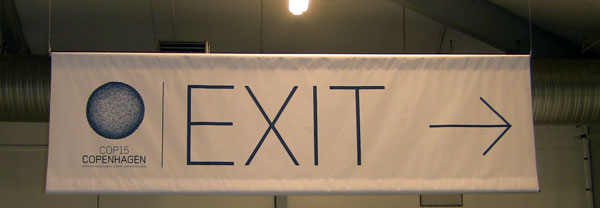
By the time you read this I’ll be on my way back to Toronto, and since I’m afflicted by an embarrassing amount of anxiety whenever I’m separated from the internet for more than a few hours, I thought it might calm my nerves to know that this post was scheduled to go live in my absence, communicating with the internets on my behalf.
This is by no means an exhaustive list, but here are some things I’ve learned this week that I don’t think I could have gotten from just following the news coverage from back home.
Canada’s international reputation really is very damaged. That’s not eco-spin or a partisan jab, it’s the reality on the ground. You can see it in people’s eyes when you introduce yourself as Canadian, and hear it in their voices as they ask how we went so wrong. I now understand first-hand what George Monbiot meant when he said that Stephen Harper risks doing to Canada what George Bush and Dick Cheney did to the United States. By the end of the week members of the Canadian Youth Delegation had actually sewed American flags onto their backpacks.
Speaking of youth, they really are having an incredible impact. I’d wondered if reports of youth influence was just pandering, but the members of the youth delegation I saw in action are truly some of the most engaged, intelligent, passionate, and affective people here.
Despite claims by some of the government’s defeatist defenders (“Canada isn’t significant enough to have an impact on the talks anyway”), Canada could have taken a major leadership position at this conference. I’ll point to two pieces of evidence. First, an account of the Rio climate talks told by Jean Charest at a press conference Wednesday morning (and confirmed by former MP David MacDonald, who’s traveling with me and was in government at the time), at which Canada was the first G7 country to sign the deal at a critical moment, convincing others to follow. Second, the fact that countries like Tuvalu and Maldives have dominated this conference due to their strong leadership, and despite their extremely small size.
There are lots of easy obvious things we could be doing that Copenhagen and other European cities take for granted. Escalators and hallway lights are all motion activated. My hotel room has a “master switch” by the door that lets me turn off all the power in the room before I leave. All toilets have two flush options. I bought a drink of Gløgg at an outdoor stand and put a deposit down on the cup, then got the deposit back by returning my cup to an automated station. All simple ideas we seem to have not even considered.
People who live in Copenhagen are hard core. It’s freezing, it’s night time, there’s snow on the ground, and they’re still cycling around the city in large numbers. And they look like they’re enjoying it.
 I stayed away from the Bella Center today, where the main climate change talks are taking place, and that seems to have been a wise decision. From now on, access to the negotiations for NGOs will be restricted more and more each day, shutting out almost everyone by Friday. Today there were reports that even those with proper authorization could not get into the Bella Center, creating a feedback loop: the more people are denied access, the more frustrated they get, increasing the passion and size of the protests, making it harder for people to get in, making everyone more frustrated, etc. I spoke with someone who has been to all 15 COP meetings. He says nothing like this has ever happened before.
I stayed away from the Bella Center today, where the main climate change talks are taking place, and that seems to have been a wise decision. From now on, access to the negotiations for NGOs will be restricted more and more each day, shutting out almost everyone by Friday. Today there were reports that even those with proper authorization could not get into the Bella Center, creating a feedback loop: the more people are denied access, the more frustrated they get, increasing the passion and size of the protests, making it harder for people to get in, making everyone more frustrated, etc. I spoke with someone who has been to all 15 COP meetings. He says nothing like this has ever happened before.